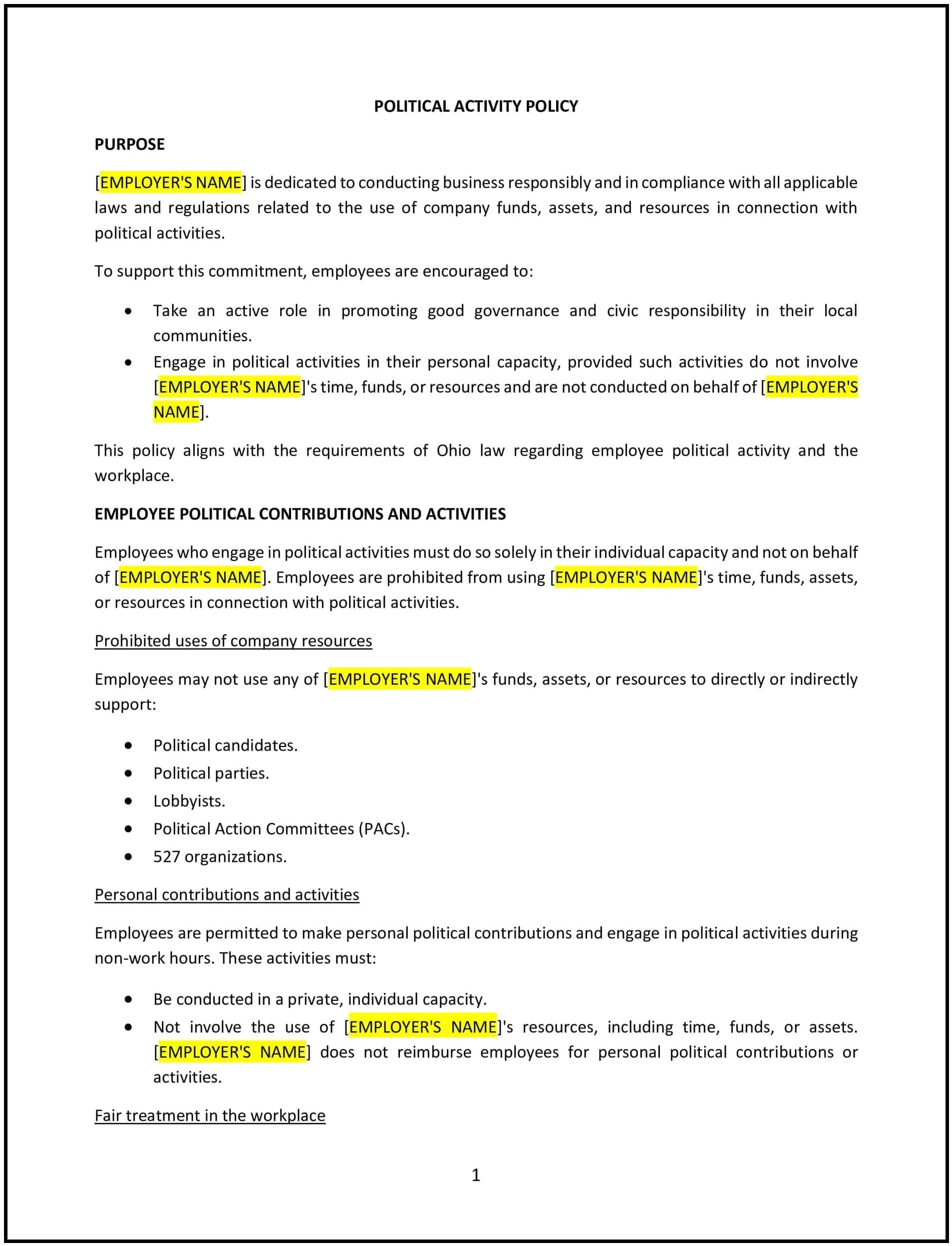Got contracts to review? While you're here for policies, let Cobrief make contract review effortless—start your free review now.

Customize this template for free
Political activity policy (Ohio)
A political activity policy provides Ohio businesses with guidelines regarding employee involvement in political activities while ensuring that business operations remain unaffected. This policy outlines acceptable and prohibited activities, such as political campaigning, use of company resources for political purposes, and participation in political events during work hours. It also addresses the business's position on political neutrality and establishes expectations for employees who wish to engage in political activities outside of work.
By implementing this policy, Ohio businesses can balance employee rights to engage in political activities with the need to maintain a professional and non-partisan workplace.
How to use this political activity policy (Ohio)
- Define acceptable political activities: The policy should specify what political activities are allowed, such as volunteering for political campaigns or attending rallies, and clarify whether such activities should occur outside of working hours and with personal resources.
- Establish boundaries for company resources: The policy should prohibit the use of company resources, including equipment, funds, or time, for political activities unless otherwise authorized. It should clearly define what constitutes misuse of company resources for political purposes.
- Clarify participation during work hours: The policy should specify that employees are not permitted to engage in political activities during working hours, unless the activity is work-related or authorized by the business, to avoid disrupting work operations.
- Address political neutrality: The policy should affirm the business’s commitment to neutrality in political matters, ensuring that company activities, communications, and resources are not used to promote any specific political candidate or cause.
- Establish guidelines for political endorsements: The policy should clarify whether employees can make public political endorsements or use the company name in relation to their personal political views, and outline whether such endorsements are allowed to be made during business hours or on social media.
- Provide guidance on political contributions: The policy should specify whether the business allows employees to use company funds or resources for political contributions and provide guidelines for making political donations in a personal capacity, if applicable.
- Maintain respect for differing views: The policy should emphasize that while political expression is encouraged outside of the workplace, employees should engage in political discussions respectfully, maintaining professionalism and avoiding conflicts in the workplace.
- Review and update regularly: The policy should be reviewed periodically to ensure that it remains aligned with Ohio state laws, federal regulations, and the evolving needs of the business.
Benefits of using this political activity policy (Ohio)
This policy provides several key benefits for Ohio businesses:
- Promotes workplace neutrality: The policy ensures that the business maintains a neutral stance in political matters, preventing conflicts of interest and fostering an environment where all employees can work together harmoniously without political tension.
- Reduces legal risks: By setting clear boundaries around political activity, the policy helps mitigate legal risks related to political endorsements, misuse of company resources, or potential workplace discrimination based on political views.
- Maintains professional work environment: The policy helps preserve the professional nature of the workplace by ensuring that political activities do not interfere with business operations or productivity.
- Enhances employee focus: By providing clarity on political activity expectations, the policy helps employees focus on their work without distractions related to political issues.
- Supports diversity of thought: While maintaining neutrality, the policy encourages respect for differing political views, allowing employees to express their opinions outside of work without fear of workplace repercussions.
- Protects company reputation: The policy ensures that the business is not inadvertently associated with political causes or candidates, protecting its reputation from any potential backlash or controversies.
- Increases employee trust: Clear guidelines on political involvement help create an environment of transparency and fairness, where employees trust that their personal political beliefs will not negatively impact their work or their relationship with the business.
Tips for using this political activity policy (Ohio)
- Communicate the policy clearly: Ensure that all employees are aware of the political activity policy by including it in the employee handbook, discussing it during onboarding, and periodically reminding employees of the expectations.
- Encourage respect for diverse opinions: Promote a respectful environment by encouraging employees to express their political opinions outside of work in a manner that does not disrupt the workplace or impact relationships with colleagues.
- Regularly review political activity trends: Stay informed of any changes in Ohio state laws or federal regulations that may affect the handling of political activities in the workplace and update the policy as necessary.
- Monitor political activity practices: Keep track of any instances where employees engage in political activities to ensure that the policy is being followed and address any potential misuse of company resources or inappropriate actions.
- Be transparent about company positions: While the business should remain neutral, it can still communicate its stance on political activities to employees and encourage them to be aware of company policies on external involvement.
- Lead by example: Ensure that management and leadership demonstrate neutrality in their own political activities to set a positive example for the rest of the workforce.
- Review and update regularly: Ensure that the policy remains relevant by reviewing it annually or after any significant changes in the business or legal landscape, making adjustments as needed.